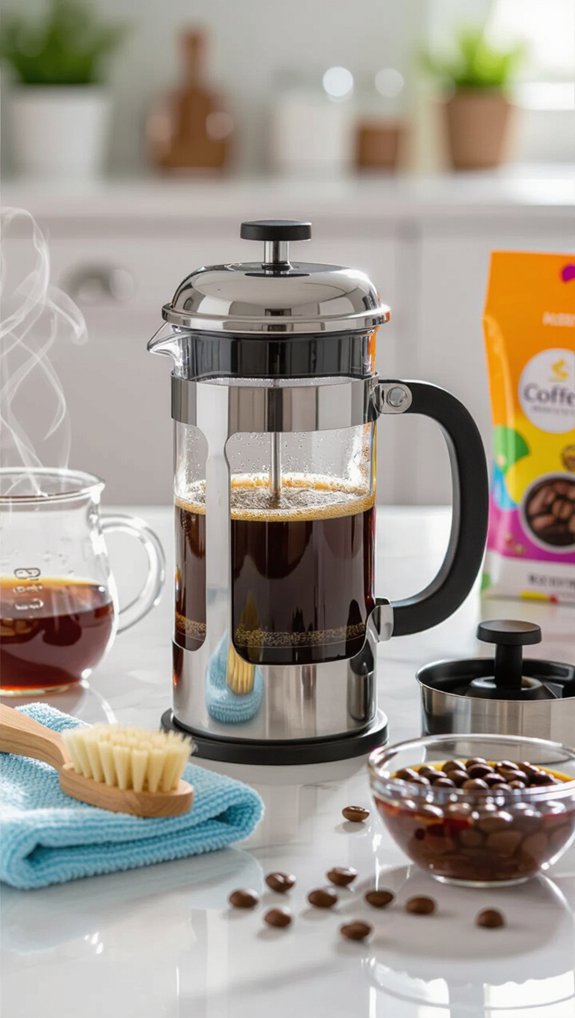Why does my French press coffee taste off lately?
If you’re wondering why your once-perfect French press coffee has developed an unpleasant bitter or rancid taste, the culprit is likely hiding in plain sight: your brewing equipment needs a thorough cleaning. Coffee oils, mineral deposits, and microscopic grounds build up over time, creating a layer of residue that sabotages even the finest beans. Many coffee enthusiasts don’t realize that inadequate cleaning is the #1 reason their French press coffee deteriorates in quality.
This guide will walk you through the complete process of cleaning your French press, from daily maintenance routines to deep-cleaning techniques that eliminate stubborn buildup. You’ll discover the specific tools and methods that coffee professionals use, plus learn how often each type of cleaning should be performed to maintain optimal flavor extraction.
Table of Contents
Why Cleaning Your French Press Matters
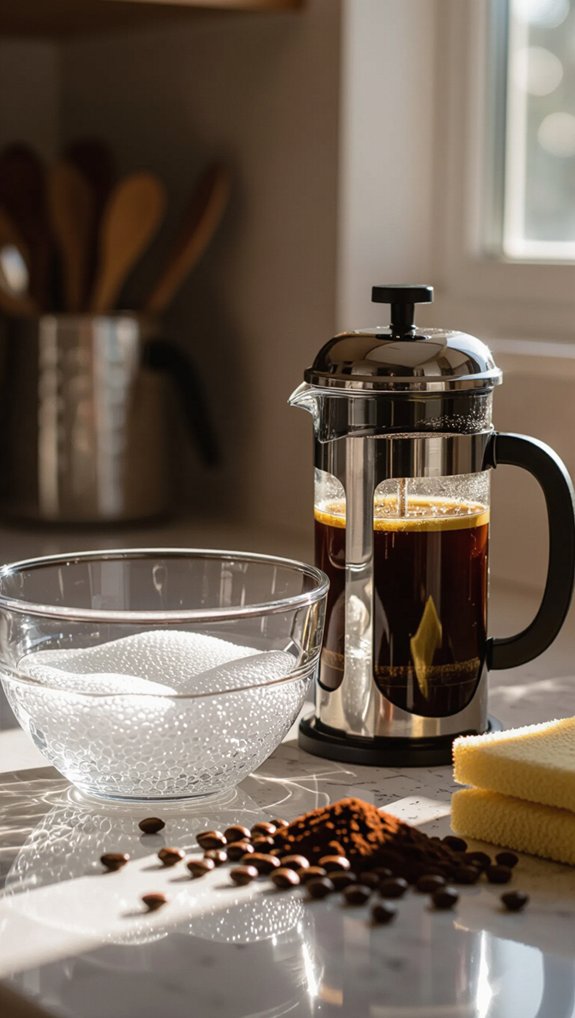
Because great coffee starts with clean equipment, grasping why you should meticulously maintain your French press is crucial for every coffee lover.
Coffee oils and trapped grounds can quickly turn rancid, transforming your beloved brew into a bitter disappointment.
The metal mesh becomes clogged with fine sediments, reducing filtration effectiveness and increasing unwanted particles in your cup.
Mineral scale from hard water builds up, interfering with your press’s performance and potentially damaging delicate components.
Daily rinsing isn’t just a chore-it’s your defense against flavor degradation and equipment breakdown.
Quick Steps For Daily Cleaning
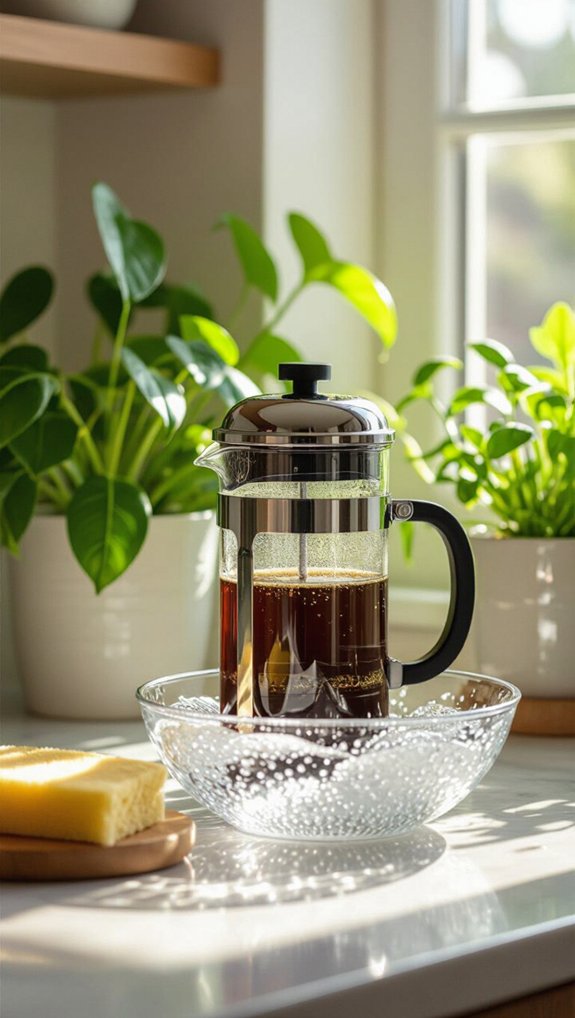
After brewing your perfect cup, I’ll show you how to quickly clean your French press and keep it in top shape.
First, you’ll want to remove the used coffee grounds, either scooping them into the compost or trash to avoid sink clogs.
Next, I’ll walk you through a simple rinse and soap technique that’ll clean your carafe, plunger, and filter in just a few minutes, ensuring your next brew tastes as fresh and delicious as the last.
Remove coffee grounds
Scrape out those spent coffee grounds immediately after brewing to keep your French press clean and ready for its next caffeine mission. Use a wooden or plastic spoon to transfer grounds into a compost bin, avoiding metal utensils that might damage glass. Remember, never send wet grounds down the sink-they’ll clog pipes faster than you can say “espresso”!
| Method | Pros | Cons | Best For |
|---|---|---|---|
| Spatula | Easy | Limited capacity | Small amounts |
| Paper filter | Clean | Single-use | Wet grounds |
| Compost bin | Eco-friendly | Requires bin | Garden lovers |
| Sink strainer | Convenient | Potential clogs | Quick disposal |
Quick tip: Let grounds dry for easier scraping if you’re not cleaning immediately.
Rinse and soap carafe
Let’s dive right into keeping your French press sparkling clean with a quick, effective rinse and soap routine.
After emptying grounds, add a few drops of liquid dish soap to the carafe and fill it halfway with hot water. Insert the plunger assembly and plunge up and down several times to loosen oils and coffee fines.
Dump the soapy water and scrub inside with a soft sponge, focusing on the bottom and rim where oils collect. Rinse thoroughly under warm running water, plunging to remove all soap residue until water runs clear.
Clean plunger and filter
Plunge into your French press cleaning routine by tackling the plunger and mesh filter with precision and care. After brewing, gently shake out grounds and rinse thoroughly under warm water. Use a soft brush to dislodge stubborn particles, creating a clean canvas for your next perfect cup.
| Task | Method | Tool | Duration | Difficulty |
|---|---|---|---|---|
| Grounds Removal | Tap/Shake | Hand | 30 sec | Easy |
| Initial Rinse | Warm Water | Soft Brush | 1 min | Easy |
| Deep Clean | Baking Soda Paste | Soft Brush | 5 min | Moderate |
| Soap Rinse | Mild Dish Soap | Sponge | 2 min | Easy |
| Dry | Air Rack | Lint-Free Cloth | 10 min | Easy |
Deep Cleaning For Fresher Coffee
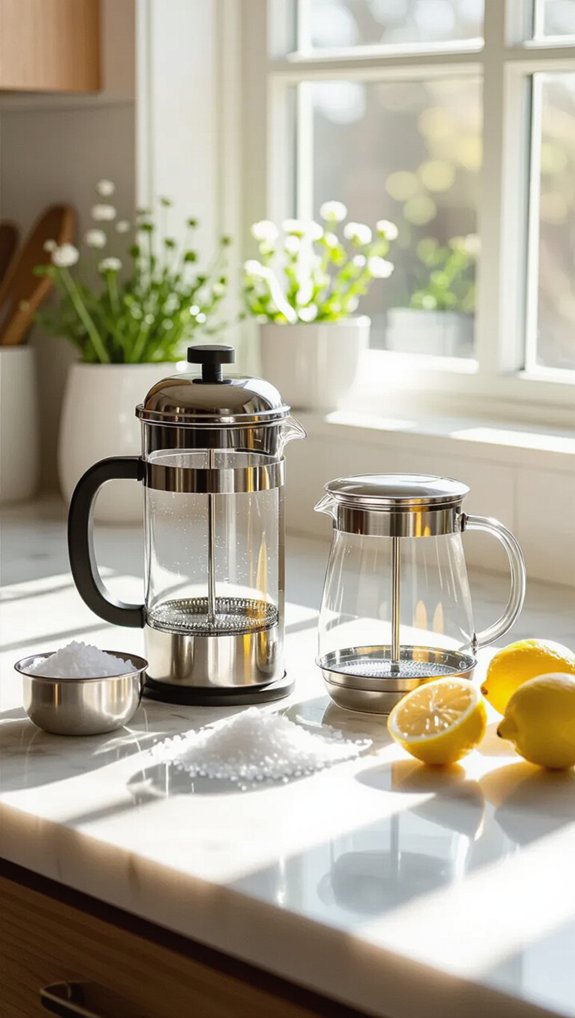
When it’s time to give your French press a thorough cleaning, you’ll want to start by completely disassembling all the components to access every nook and cranny.
I recommend soaking the parts in a 50/50 white vinegar and hot water solution, which helps dissolve stubborn coffee oils and mineral buildup that can affect your brew’s flavor.
After soaking, grab some baking soda and create a gentle scrubbing paste that’ll help remove any remaining residue from the mesh screens and carafe interior, ensuring your next cup of coffee tastes fresh and clean.
Disassemble all parts
Because coffee oils can quickly turn rancid and compromise your brew’s flavor, you’ll want to disassemble your French press thoroughly during deep cleaning. Carefully unscrew the plunger assembly into its individual components, paying close attention to the mesh screen, cross plate, and gasket.
| Part | Cleaning Technique | Drying Method |
|---|---|---|
| Mesh Screen | Soft brush | Air dry |
| Plunger Rod | Mild soap | Towel dry |
| Gasket | Vinegar soak | Air dry |
| Cross Plate | Hot water rinse | Towel dry |
Soak each part individually to remove stubborn coffee oils and ensure a pristine brewing experience.
Soak in vinegar solution
Dissolving stubborn coffee residue requires a strategic approach, and a vinegar solution offers the ultimate deep-cleaning method for your French press.
Mix distilled white vinegar and hot water in equal parts, ensuring enough liquid to fully submerge your carafe and disassembled plunger parts.
Let everything soak for 30-60 minutes, which helps break down mineral deposits and persistent coffee oils.
For tough hard-water buildup, increase the vinegar ratio or extend soaking time.
Use a soft brush to gently scrub the mesh filter, targeting areas with stubborn residue.
Rinse thoroughly with fresh water to eliminate any lingering vinegar smell.
Scrub with baking soda
Breathe new life into your French press by leveraging the power of baking soda-a natural, gentle cleaning agent that’ll cut through stubborn coffee oils and lingering residue.
Mix 1-2 tablespoons of baking soda with a few teaspoons of water to create a spreadable paste. Apply this mixture to your carafe and metal filter, using a soft sponge or old toothbrush to scrub in circular motions.
The mild abrasive action lifts stains without scratching delicate surfaces. Rinse thoroughly with warm water, ensuring no baking soda residue remains.
Your French press will look-and taste-like new.
Best Tools For Cleaning Success
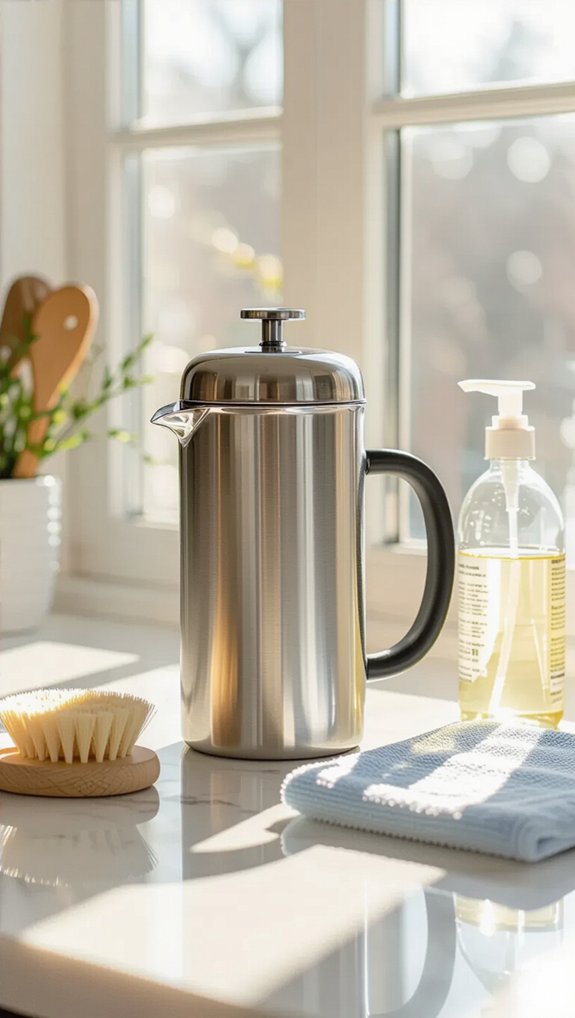
Let’s dig into the essential tools that’ll transform your French press cleaning routine from a chore to a breeze. Your cleaning arsenal should include a few key items that’ll make maintenance simple and effective:
- A soft bottle brush (5-8 inches) for reaching curved carafe walls without scratching
- A small toothbrush for cleaning intricate filter mesh and plunger crevices
- A thin silicone spatula for scooping compacted coffee grounds
With these tools, a bit of baking soda and water, and a paper towel for drying, you’ll keep your French press sparkling clean and ready for the next perfect brew.
Tips For Disposing Coffee Grounds
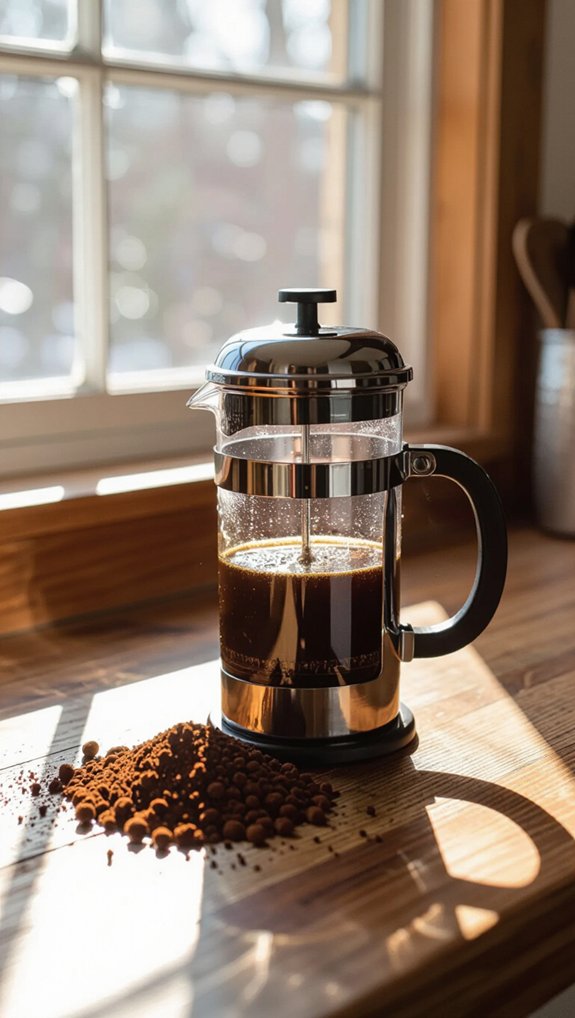
After brewing that perfect cup of French press coffee, you’ll want to handle those spent grounds with care and creativity. Tossing them down the garbage disposal or sink? Not recommended! Those wet grounds can quickly clog pipes and create plumbing nightmares.
| Disposal Method | Best Practices |
|---|---|
| Compost | Rich in nitrogen, great for gardens |
| Trash | Dry first to prevent odors |
| Garden | Light mulch for acid-loving plants |
| Containers | Collect in dedicated bin for easy disposal |
Pro tip: Let grounds dry completely before disposal to minimize mess and maximize recycling potential.
Keeping Your French Press Smelling Fresh
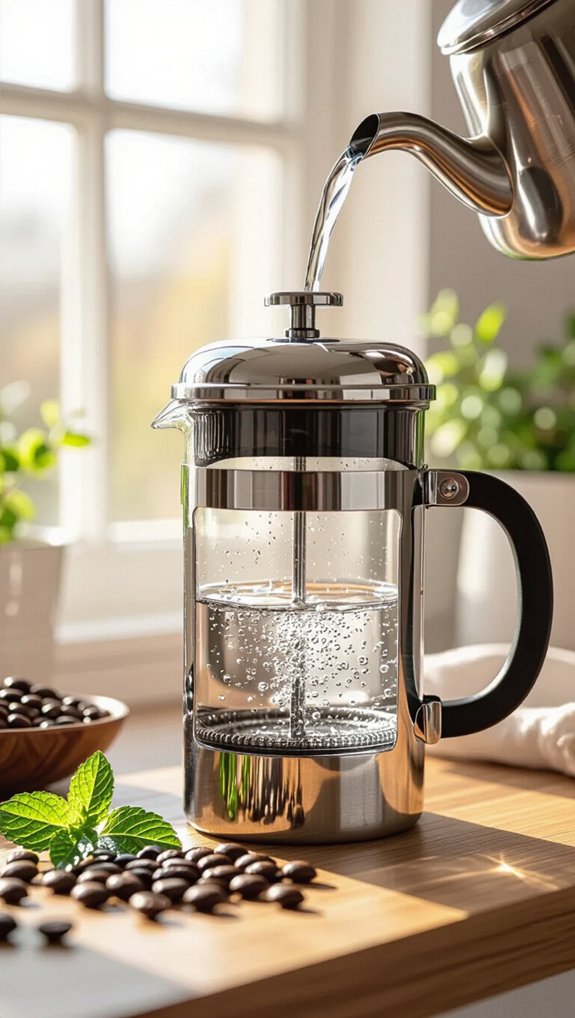
Periodically, coffee enthusiasts discover that a French press can develop unwelcome odors if not properly maintained. Keeping your French press clean requires some strategic approaches that’ll preserve its fresh, roasty character.
- Use a 1:1 solution of distilled white vinegar and hot water to neutralize stubborn smells
- Sprinkle baking soda inside the clean, dry carafe to absorb lingering odors overnight
- Always air dry components completely to prevent musty development
Frequently Asked Questions
What Is the Easiest Way to Clean a French Press?
I rinse my French press with hot water right after brewing, knock out the grounds, and give it a quick scrub with a soft sponge. For deeper cleans, I’ll use mild soap and thoroughly dry all parts before reassembling.
How to Dispose of Coffee Grounds in a French Press?
I’ll compost my coffee grounds or toss them in the garden. If not possible, I’ll seal them in a bag before trashing. I’ll never dump them down the sink or toilet to avoid potential plumbing clogs.
How Do You Clean the Mesh on a French Press?
I rinse the mesh under hot running water right after brewing, using my fingers to dislodge grounds. For stubborn oils, I’ll soak it in a vinegar-water solution, then gently scrub with a soft brush before thoroughly rinsing.
How to Clean Residue off a Heat Press?
I clean residue off my heat press by gently wiping with a warm, soapy cloth, using isopropyl alcohol for stubborn spots. For tough buildup, I’ll apply a baking soda paste, then carefully scrub with a soft pad, finishing with an alcohol wipe.
In Conclusion
Keeping your French press clean isn’t just about maintenance-it’s about preserving that perfect cup of coffee. By following these simple cleaning techniques, you’ll prevent bitter oils from building up and ensure each brew tastes as fresh as the last. Whether you’re doing a quick daily rinse or a deep vinegar soak, a little care goes a long way in elevating your home brewing game. Cheers to cleaner coffee!

